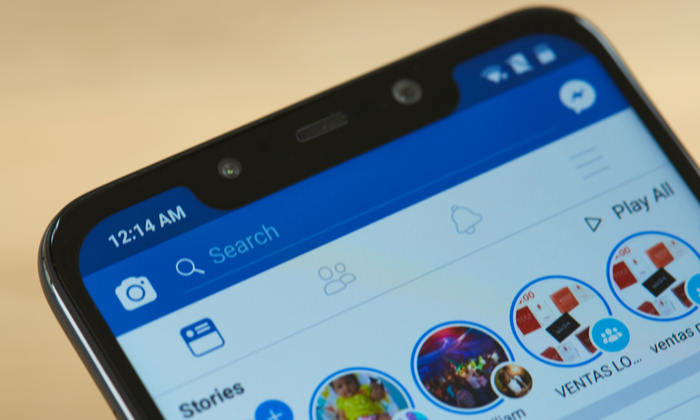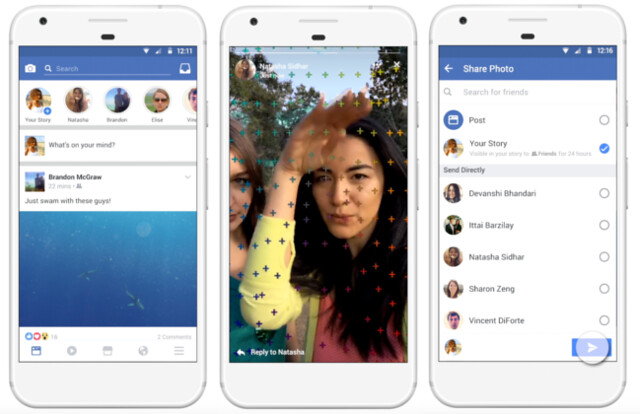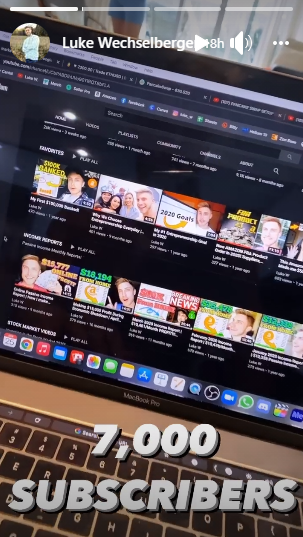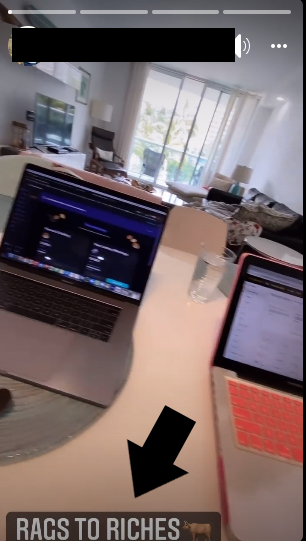
Everyone loves a good story, so why not use them for business?
Facebook Stories are great to grab and keep attention in a world where attention is our currency. The platform offers various customization options to help make your stories more engaging to convert more leads.
Here are some of the actionable steps you can take to implement Facebook Stories in your marketing strategy.
What Are Facebook Stories?

Facebook Stories allow users to upload content that will disappear after 24 hours. The main point of this feature is to enable people to upload something that might be time-sensitive or something they don’t want everyone to see forever.
Whether it’s a quick photo of something going on in your personal life or a short-term business opportunity that you only want available for 24 hours, Stories mimic what made Snapchat so popular.
What makes Facebook Stories unique is you can pile a bunch of stories back-to-back. If you’re trying to create a fun experience for users who land on your page, you can trickle down images, photos, and videos from one story to the next. This is a great way to keep people engaged and clicking over to the next story.
How Do Facebook Stories Work?
One of the best things about Facebook Stories is how easy they are to use. All you need to do is go to the top of your Facebook profile and click “add story.”
Learning how to use Facebook Stories doesn’t require you to have a lot of experience on the platform, and if you’ve ever used the story feature on Instagram or Snapchat, it’s essentially the same thing.
The big question is, how long can Facebook Stories be? They are currently 20 seconds, which can be the perfect amount of time. It’s not too long but not too short, and it skates on the line of the typical eight– to 10-second attention span we know people have on social media.
Another one of my favorite things about Stories is you can see who saw your post by clicking the eye icon at the bottom of the screen. If you’re targeting a specific group of people, you can determine if your story is reaching the right audience.
Why Should You Use Facebook Stories for Your Business?
Here are some of the primary reasons to use Facebook Stories to grow your business.
Autoplay and Mobile First
If you regularly upload content onto social media as part of your marketing strategy, you’ll love the autoplay feature. This makes it so easy to move people through a social funnel and get them to see everything you want them to without clicking away right off the bat.
As someone is watching your story, it will automatically move them into the next story, and the next, and the next. Even if they tap the screen, they’ll still move over to the following story, giving you multiple opportunities to draw their attention and keep it long enough to create your desired action.
Mobile-first is another great feature of Stories. When you click on someone’s story on Facebook, it will automatically fill the whole screen vertically so the user can see nothing else but the content. This ensures there are few distractions to draw their attention away from the video.
Plus, people like watching story content. With more than 500 million people using Stories every day, there are plenty of opportunities for you.
Plenty of Customization
Stories are a great way to show off your brand, showcase your uniqueness, and draw attention to yourself. Many businesses use Stories to create behind-the-scenes content of things they won’t show in a perfectly polished YouTube video.
Stories pull back the curtain and show your followers you’re a regular person running a business, and there are many reasons to do business with you. Remember, people buy from people. They don’t buy from businesses.
Create Urgency
We all know urgency is a huge factor when it comes to sales, and telling someone that something will disappear after a period of time can get them to make a quick decision and react before the opportunity is gone.
Since Stories disappear in 24 hours, you can use them to your advantage. You can tell people whatever opportunity you’re presenting will go away once the story goes away. This should work well for anyone who is in a B2C environment.
Simple to Engage
Facebook Stories make engagement so easy because they provide so many different ways for you to do it. You could tell people to swipe up to access something, click a button, like, and follow. It takes up the whole screen and really dials people in for a moment.
There are many distractions on Facebook. It’s difficult to get someone’s undivided attention online, but Stories come about as close as you possibly can to getting their full attention.
Another interesting and overlooked factor about Stories is people have to tap on the story to see it. Doing so puts users in the habit of already tapping on something, which will increase the likelihood of tapping through your story to see the whole thing.
There’s a lot of psychology behind this. It’s the same as the “obvious yes answer” a lot of speakers use. You ask a large crowd a question or say something where most of the crowd will answer yes. What you’re doing is getting the crowd into the habit of saying yes and nodding their heads. In the end, getting them in the habit of doing this increases their chances of purchasing whatever it is you’re selling at the end.
How to Use Facebook Stories for Marketing
Now that we’ve laid the groundwork, here are some of the actionable steps you can take to use stories for your marketing.
Use Polls to Encourage Engagement
One of the simplest ways to create engagement with your audience is to ask them for their opinion. This is also a powerful way to conduct market research in a short amount of time. Let’s say you’re a course creator, and you want to know if your audience would be interested in a new course on creating raised garden beds.
You can create a story asking them if that’s something they would be interested in. Be as transparent as possible and ask if they think they’d pay for something like that. You can do a few things to get market research in such a short amount of time with such little effort.
Even better, if they answer the Facebook Stories poll, you can prompt them to sign up for a beta test or capture their email when the course does come out.
Post About Sales
If you have a time-sensitive sale that might run out in the next 24 hours, why not post about it on a story? Using Facebook Stories for business is all about getting the right message to the right audience at the right time.

As you can see in the example, social media influencer Luke Wechselberger posts little wins, such as gaining 7,000 subscribers on YouTube. Not only is this a great way to get attention, but it also helps motivate others.
You never know who may have been sitting in the background waiting for you to reduce the price of something, and now they’re ready to jump at the opportunity. Make it as simple as possible for them to convert as well. Use the swipe-up feature to take them directly to a checkout page or wherever it is you’re selling the product or service.
Add Links and Buttons to Your Stories
The goal is to make your story as engaging and eye-catching as possible. Keep in mind Facebook’s audience (while still young) is trending older. You’re now dealing with people who aren’t sitting on social media for four hours. You’re marketing to busy individuals who might simply be scrolling through while they’re waiting to get into an appointment or are on their lunch break at work.
Adding links and buttons to your stories makes it easier for them to convert, and it also draws attention to the story itself. When they see a button pop up, it makes it look like an action should happen versus just watching something for sheer enjoyment.
Highlight Special Events or Holidays
The fact that Stories sit right at the top of the Facebook news feed is a big part of what makes them so powerful. As soon as someone comes onto Facebook, they’re greeted with the story, and if you’re using it the right way, you’re sure to generate a lot more attention there than you would with a regular post.
If you’re trying to highlight a special event or holiday special, be sure the goal and objective of the video are as clear as day when they open the video. Don’t make them stick around too long before giving out the details, otherwise, they’ll be gone before you know it.
Share a New Product or Service
When you come out with something new, the first thing you want to do is let everyone know about it, right? Sharing it on your story not only gets the word out quickly, but also gets people in on it right away.
If something is “new,” people are intrigued by it and may want to be one of the first to try it. Facebook Stories are a great place to bring betas because you’re sure to find plenty of folks who are willing to test out the product or service for free or at a reduced price.
Spread the Word About a Contest
The same thought process applies to contests. The goal of most contests is to get the word out to as many people as possible.
Stories help spread the word because users can flow right through previous stories and stumble upon yours without even meaning to. If you’re engaging them and drawing them in with the story, they’ll show interest in your contest and may even participate.
Share User-Generated Content

User-generated content is like the whipped cream on a sundae when it comes to marketing. It perfectly accompanies the content you’re already creating. If you’re trying to build trust in your audience, what better way to do so than by posting reviews and compliments you receive from people who’ve already purchased from you?
Using the course creator example again, you can share results that other people got from completing your course if you make courses. If your courses focus on gardening, why not share pictures of the gardens everyone built from listening to your advice and taking your classes?
4 Tips for Using Facebook Stories
Here are some of my biggest tips to help you get the most out of your Facebook Stories.
- Use stories for time-sensitive posts: Whenever you have anything that is time-sensitive, be sure to use a story for it. Be clear about the deadline, too so you don’t have any confusion or upset customers.
- Make it interactive: Make the story as interactive as possible. Provide multiple ways for people to convert, use colors, and include graphics wherever you can to keep their attention.
- Set goals for your campaigns: While creating stories may be fun, you do need to keep in mind you’re trying to convert people. Track everything and take note of which stories perform the best. Take the ones that perform well and analyze what you did differently compared with the rest.
- A/B test different content formats: Test everything. Always test different formats, different CTAs, and different landing pages as well. If you’re getting a lot of people to click through to the landing page but then they bounce, this would tell you your landing page needs work. If you’re not tracking and testing, you would never know.
Conclusion
Facebook Stories are simply one piece of the marketing puzzle. As marketers, we try to do everything we can to reach as many people as possible. Increasing our reach to the right audience is the biggest determining factor in the success of a campaign. We have resources to help you if you’re struggling to find success with your Facebook marketing.
Remember, nothing happens quickly, so experiment with different stories, try different CTAs, and track all the data so you can see what is working the best.
Do you think Facebook Stories are a powerful way to reach your audience? If not, why not? Do you use them? Let me know in the comments below!
from Blog – Neil Patel https://ift.tt/3nITXQW

No comments:
Post a Comment